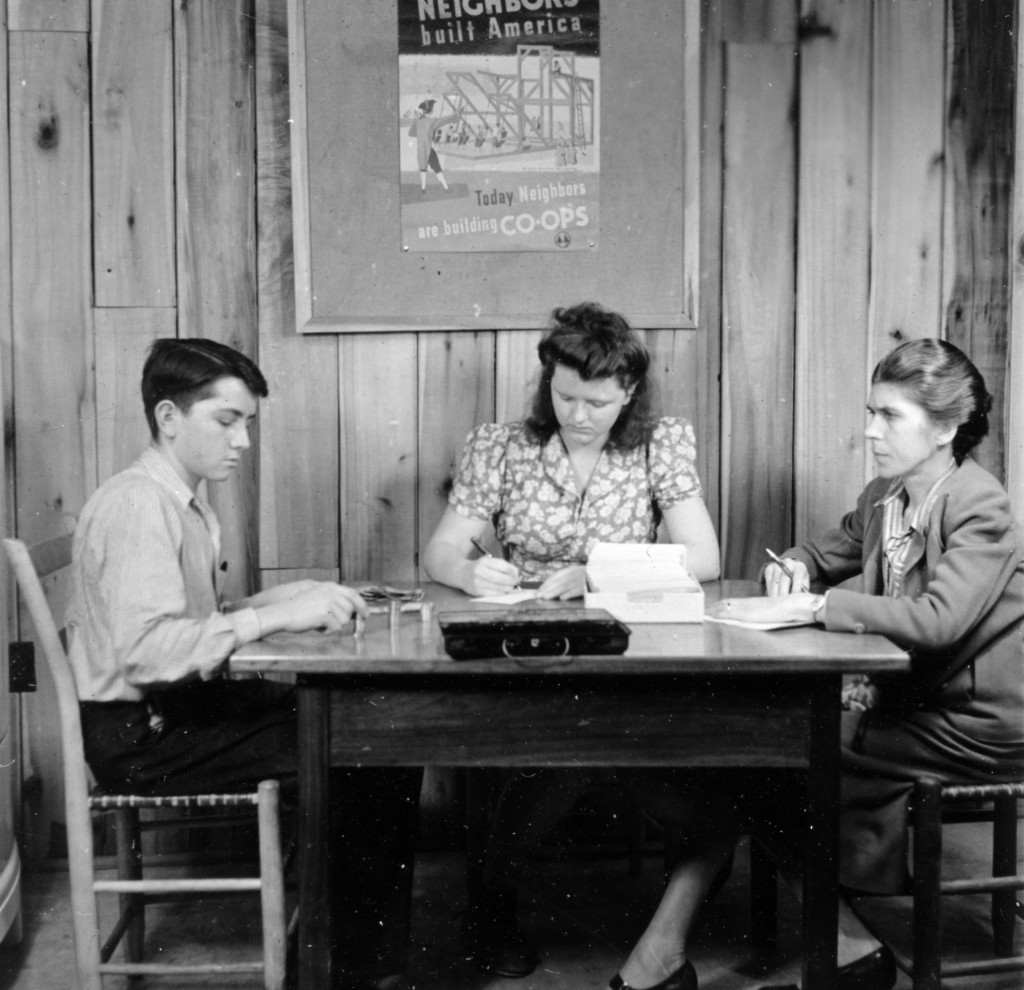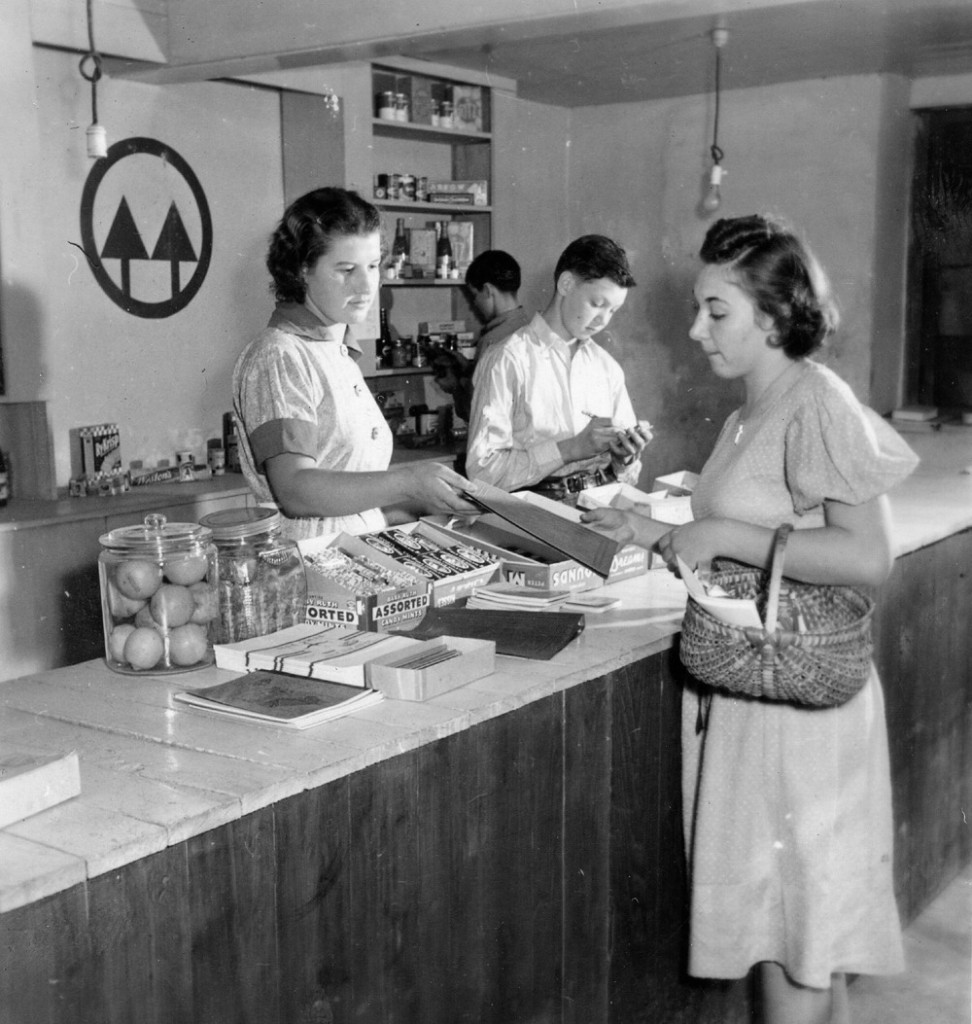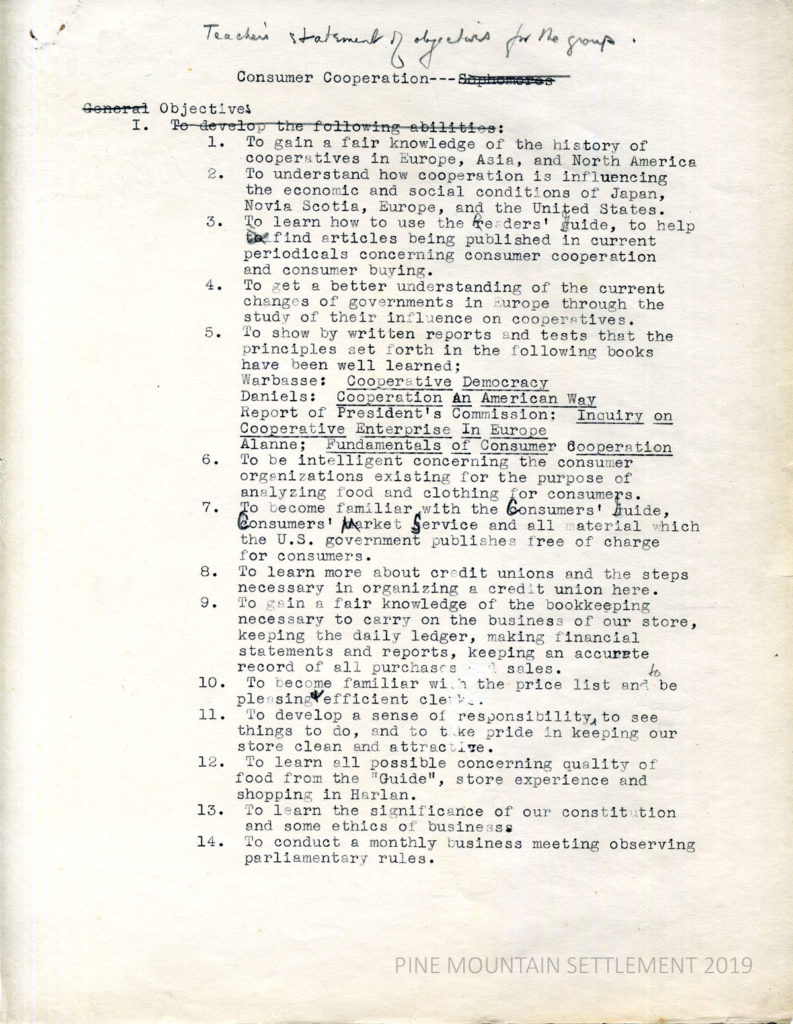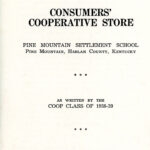Pine Mountain Settlement School
Series 13: EDUCATION
Series 19: STUDENTS
Consumer Cooperative Curriculum

Instructor Gladys Hill (right) with co-op students,1941. (Source: Harmon Fdn stills) [pmss_photo_coop_harm_091DB.jpg]
TAGS: consumer cooperative curriculum, Consumers’ Cooperative Store booklet, PMSS students, community, early history of co-ops, Consumer Cooperation Objectives, resources for cooperative store information, credit unions, bookkeeping, business ethics, Rochdale principles
EDUCATION Consumer Cooperative Curriculum
EARLY HISTORY OF CO-OPS
Consumer Cooperatives date back to the early weaving history in England. It is not surprising, then, to find them readily welcomed by Pine Mountain Settlement School, not only for their English heritage but also for their cooperative Settlement ideas. In a cottage in Fenwick, a community of weavers in East Ayrshire, England, a historical document tells of the establishment of what is believed to be the first instance of a “consumer cooperative.” They called themselves the Fenwick Weavers’ Society. Collectively buying and selling grain at a discount within the community, the weavers were able to better the market prices and to begin to pay dividends. By 1844, the co-operative idea had proliferated in England, and a formalized model of a co-operative was established called the Rochdale Society of Equitable Pioneers. It formed the prototype of basic principles on which co-op stores operate today.
The idea of a co-op resonated across the early administrations of the Pine Mountain Settlement boarding school curriculum and by 1944 it had caught the attention of Kentuckians. An article by Courier-Journal Staff Writer, Sol Schulman, noted that the Neighborhood House in Louisville, a Settlement Movement institution with close ties to Pine Mountain, had a thriving co-op. Schulman describes it as having fifty members across a broad spectrum of society. The early model was an agrarian one, especially the local growers’ markets. Co-ops readily saw a benefit in the cooperative which allowed them to borrow money on their crops which could then be sold when prices were “more attractive.” This cost-benefit had great appeal in rural areas and particularly in counties like Harlan, hard hit by the Depression and the boom-bust economy of coal. Further, Schulman explains the appeal:
The idea behind Kentucky’s tobacco, dairy, wool, and berry pools, its cattle breeding, sorghum, and vegetable pools, its credit unions, medical care associations and consumers’ co-operatives, …
[was a movement to be celebrated]
Through such organizations growers could also buy equipment, some of it for joint use; conduct campaigns to establish uniform grading of their products, and study methods of packaging.”
Sol Schulman, “Co-ops’ Hundredth Year May be the Hardest,” Louisville Courier Journal, ?, 1944 [Undated Newspaper clipping PMSS Collections]
Schulman would be amazed at how close Pine Mountain School’s attention to these ideas has carried forward. No longer a part of a curriculum, the ideas developed by co-ops have found their way into the programs of the School. Schulman was intrigued in 1944 when his attention to co-ops turned to Pine Mountain Settlement where the idea of co-ops had found a new emphasis as part of the progressive movement and had also captured the attention of education.
CONSUMER COOPERATIVE AT PINE MOUNTAIN
Schulman’s article describes the Co-op at Pine Mountain Settlement School in operation since 1937, as an exemplary model. He describes the mountain co-op store on campus as largely centered on an inventory of groceries and school supplies and modeled on the Rochdale principles as a base for the sophomore curriculum at the School. He outlines the Rochdale principles:
-
- Voluntary open membership
- Democratic control (one member-one vote)
- Limited interest on capital
- Distribution of savings according to purchase
- Cash trading at market prices
- Religious and political neutrality
- Constant education
The Harmon Foundation, a national philanthropy, also noticed the PMSS innovative school program and sent two noted filmmakers, Virginia and Ray Garner, to Pine Mountain to record their co-op program. The Garner color film was distributed broadly and even found its way to China where it was translated and shown in several venues. Black and white stills from that endeavor are in the PMSS Collections photo archives.
OPPOSITION BY FEDERAL AGENCIES
While there was much progressive hand-clapping for co-ops, there was a gathering opposition to the co-op ideas in many corners of the Federal Government and the growing industrial world. Of particular ,opposition attention was the tax-exemption component of co-ops noted by the Federal Government but other oppositions surfaced in more subtle ways:
-
- The threat to Federal agencies such as the Commodity Credit Corporation
- Penalizing those who divert money to the Bank for Cooperatives and cooperatives who do not pay interest to the US government
- Recalling of Production Credit Corporation money to the US government
- Instituting bans by the Farm Security Administration of loans to co-ops and even clients for membership in co-ops
- Fighting against the rural electrification co-ops such as REA.
However, Pine Mountain Settlement soldiered on as did co-ops across the country.
One of the most innovative programs at Pine Mountain, the Sophomore Consumer Cooperative curriculum met several standard educational objectives including academic and industrial education. The program grew from an original idea put forward by Angela Melville who came to the School in the early years as a fundraiser and office worker from 1916 to 1920. She later briefly served as Principal and then as associate director from 1928 to 1930 and was a long-time member of the Pine Mountain Settlement School Board of Trustees. She came with masterful skills.
The idea of a Consumer Cooperative is not far from the idea of a consumer cooperative bank, now called a “credit union,” and Angela Melville was quick to see the similarities and how those similar structures would help students to later manage their finances. Her early work was so effective that it was integrated into her model for credit unions for which she later gained national recognition. Following her work at Pine Mountain Melville, she became recognized for helping to establish and standardize guidelines for business management instruction and credit unions across the United States.
From the origins in a small weaving community in England to a worldwide idea to a small weaving community in the mountains of Eastern Kentucky, the consumer cooperative idea survived its opposition and is now a well-established concept and an excellent educational model. The ideas put forward by the Rochdale model, and instituted later by Melville in her curriculum at Pine Mountain and in her credit union work, no doubt resonated with growing national trends in that direction.
However, ideas have a way of getting side-tracked where money exchanges hands. Consumer co-ops were among many cooperative ideas that went astray following WWII.

Co-op in Laurel House II basement. Arthur W. Dodd Album. [dodd_A_036_mod.jpg]
Schulman’s article appeared one hundred years out from the founding of the Rochdale model. In 1944 opposition politics saw the Chicago Morrison Hotel, the location of the traditional co-op convention, taken over by a new group, the League for the Protection of Private Enterprise which became a coordinating group opposed to co-ops and who declared that
“The organization hopes, eventually, to represent not only grain, lumber, oil, and coal interests, but also feed companies, retail clothiers, produce and commission houses, dairy groups, furniture and hardware companies, real estate agents, meat dealers and livestock associations.”
Quoted in Schulman, Sol. “Co-ops’ Hundredth Year May be the Hardest.” Louisville Courier Journal, ? 1944.

Girl’s Industrial. Interior view of Co-op Store, c. 1941. (Source: Harmon Fdn. still).
CONSUMER COOPERATIVE STORE 1938-1939 CURRICULUM
For the 1938-1939 school year a small booklet, Consumers’ Cooperative Store was developed for the Pine Mountain Settlement School curriculum. It acted as a guide for students who became members and for the community that also participated.
GALLERY
- 000 consumer_co-op_booklet_cover
- 001 consumer_co-op_booklet_001
- 003 consumer_co-op_booklet_003
- 004 consumer_co-op_booklet_004
- 005 consumer_co-op_booklet_005
- 006 consumer_co-op_booklet_006
- 007 consumer_co-op_booklet_007
- 008 consumer_co-op_booklet_008
- 009 consumer_co-op_booklet_009
- 010 consumer_co-op_booklet_010
- 011 consumer_co-op_booklet_011
- 012 consumer_co-op_booklet_012
- 013 consumer_co-op_booklet_013
- 014 consumer_co-op_booklet_014
TRANSCRIPTION: Consumer Cooperation Objectives
In a class hand-out, the Consumer Cooperative class objectives were described in the following manner by the teacher (not identified), The instructor’s edits to the class hand-out may be seen in the copy.
(Handwritten note at top of the page: “Teacher’s statement of objectives for the group.”)
- To gain a fair knowledge of the history of cooperatives in Europe, Asia, and North America
- To understand how cooperation is influencing the economic and social conditions of Japan, Nova Scotia, Europe, and the United States.
- To learn how to use the readers guide, to help find articles being published in current periodicals concerning consumer cooperation and consumer buying.
- To get a better understanding of their use in the current changes of governments in Europe through the study of their influence on cooperatives.
- To show by written passports and tests that the principles set forth in the following books have been well learned: Warbasse: Cooperative Democracy; Daniels: Cooperation an American Way; Report of President’s Commission: Inquiry on Cooperative Enterprise in Europe; Alanne: Fundamentals of Consumer Cooperation
- To be intelligent concerning the consumer organizations existing for the purpose of analyzing food and clothing for consumers.
- To become familiar with the Consumers’ Guide, Consumers’ Market Service and all material which the U.S. government publishes free of charge for consumers.
- To learn more about credit unions and the steps necessary in organizing a credit union her.
- To gain a fair knowledge of the bookkeeping necessary to carry on the business of our store keeping the daily ledger, making financial statements and reports, keeping an accurate record of all purchases and sales.
- To become familiar with the price list and to be pleasing and efficient clerks.
- To develop a sense of responsibility, to see things to do, and to take pride in keeping our store clean and attractive.
- To learn all possible concerning the quality of food from the “Guide”, store experience and shopping in Harlan.
- To learn the significance of our constitution and some ethics of business.
- To conduct a monthly business meeting observing parliamentary rules.

Consumer Cooperation Objectives. [consumer_co-op_obj_001]
See Also:
ANGELA MELVILLE Correspondence 1925-1929
ANGELA MELVILLE Educational Plan 1929
EDUCATION Consumer Cooperative Curriculum
EDUCATIONAL PROGRAMS Guide
PUBLICATIONS PMSS Experiences in Consumer Education 1940-1941















